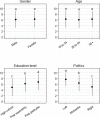Perceptions of the health impacts of climate change among Canadians
- PMID: 36721132
- PMCID: PMC9887551
- DOI: 10.1186/s12889-023-15105-z
Perceptions of the health impacts of climate change among Canadians
Abstract
Background: Understanding public perceptions of the health risks of climate change is critical to inform risk communication and support the adoption of adaptive behaviours. In Canada, very few studies have explored public understandings and perceptions of climate impacts on health. The objective of this study was to address this gap by exploring perceptions of the link between climate change and health.
Methods: We conducted a survey of Canadians (n = 3,014) to address this objective. The 116-question survey measured prior consideration of the link between climate change and health, affective assessment of climate health impacts, unprompted knowledge of climate health impacts, and concern about a range of impacts. ANOVA tests were used to assess differences among sociodemographic groups.
Results: Overall, Canadian's have a similar level of concern about health impacts of climate change compared with concern about other impacts (e.g. biophysical, economic, and national security). Among health-related impacts, respondents were more concerned about impacts on water, food and air quality, compared with impacts on mental health, infectious diseases and heat-related illnesses. There were differences among sociodemographic groups; women were significantly more concerned than men about all of the health-related impacts; respondents with a high school level of education were significantly less concerned about all health-related impacts compared with respondents with more education; and respondents on the political left were more concerned with those in the political centre, who were more concerned than those on the political right.
Conclusion: There is emerging literature suggesting that framing communication around climate change in terms of the health risks it poses may increase perceptions of the proximity of the risks. These results suggest that it is important to be specific in the types of health risks that are communicated, and to consider the concerns of the target sociodemographic groups. The differential knowledge, awareness, and concern of climate health impacts across segments of the Canadian population can inform targeted communication and engagement to build broader support for adaptation and mitigation measures.
Keywords: Canada; Climate change; Climate opinions; Health impacts of climate change; Risk perceptions.
© 2023. The Author(s).
Conflict of interest statement
The authors declare no conflict of interest.
Figures





References
-
- Levy BS, Patz JA, editors. Climate Change and Public Health. Oxford, UK: Oxford University Press; 2015.
-
- Maibach EW, Kreslake JM, Roser-Renouf C, Rosenthal S, Feinberg G, Leiserowitz AA. Do americans understand that global warming is harmful to human health? Evidence from a national survey. Annals of Global Health. 2015;81:396–409. - PubMed
-
- Roser-Renouf C, Maibach EW, Leiserowitz A, Zhao X. The genesis of climate change activism: from key beliefs to political action. Clim Change. 2014;125:163–78.
Publication types
MeSH terms
Grants and funding
LinkOut - more resources
Full Text Sources
Medical
Miscellaneous

